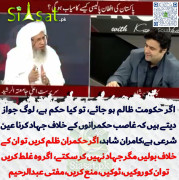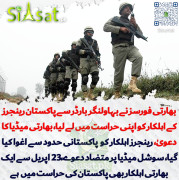modern fakir
MPA (400+ posts)
Taqlid can be defined as the acceptance of a mujtahid's statements (fatawa) without knowing his references (evidences) [an-Nawawi, Tazeeb; and Qadi Shawkani, Irshad al-Fahul]
There is a consensus amongst the majority of Muslims that we should follow the four major Imams in matters of Shari'a. Such matters include:
Those matters in which there is no direct, single and clear meaning in sources of Shari'a
When there exists a difference of opinion between the Sahaba upon an issue, the Imams have tried to show the similarities in them
We only observe taqlid in matters of fiqh, not in our 'aqida. The unity of Allah, the finality of the Prophet Muhammad (may Allah bless him and grant him peace) and the Day of Judgement etc. are matters of 'aqida so they are not concerned with taqlid.
Some say that it is a form of shirk (polytheism) to observe taqlid of anyone apart from Allah. In particular, to follow only one Imam is a bid'a. They say that the evidence from all the Imams should be read and weighed in order that only those verdicts based upon strong evidence can be accepted and weak ones rejected.
The view of the Ahl as-Sunna wa'l-Jama'a is that it is impossible for an ordinary Muslim to go directly to the Qur'an and Sunna and extract religious laws. This is due to the fact that these sources of knowledge contain many matters which are unclear - thus requiring research into many other sources along with the application of rules which assist in understanding the matter under study. In order to do this, a person needs to possess both a deep and broad knowledge of Islam, which is both impractical and not incumbent upon each and every Muslim. Allah does not expect all Muslims to become scholars, rather He orders them to refer to those who have knowledge. Consider the following verse:
"And ask those who recall, if you know not"
[Sura 16, verse 43]
Also, in Sura Nisa:
"If they had referred it to the Messenger and to those of authority among them, then those of them whose task it is to find it out would have known the matter"
[Sura 4, verse 83]
For those who have the necessary pre-requisites, such as being a master of 'ulum al-Qur'an, master of ahadith and their principles, 'aqa'id, fiqh principles, Tafsir and its principles, and jarh wa ta'dil (the science of hadith narrators). They are allowed to take ahkam (legal rulings) from the Shari'a. Such a person can be called a mujtahid. However, many great scholars who were qualified to perform ijtihad, followed Imams. For example, Qadi Abu Yusuf, Imam Muhammad and Imam Zafar were able to perform ijtihad but followed the opinion of Imam Abu Hanifa.
There are many categories of hadith such as mutawatir (rigourously authenticated), authentic, not authentic, weak and those which are fabricated.Some are mansukh, which means that certain matters were at first permissible but later made impermissible - for instance talking during the salat during the early period of Islam was permissible but later on made unlawful. This is why taqlid is a necessity - the scholars have taken all the above into consideration before issuing their verdict.
[h=3]
Rejectors of taqlid[/h]
Those who tried to reject taqlid, like Hafiz Ibn Taymiyya, were unsuccessful. He was, however, not a muqallid (one who must do taqlid of a mujtahid) like the ordinary people. Nether the less, his works of literature contain influences from the Hanbali school of thought. He always preferred his fatwas to Imam Ahmad's. His followers also claim that they are not muqallid to anyone and taqlid is bid'a. But, they always perform taqlid of Hafiz Ibn Taymiyya and quote fatawa from his books. The following is one such example:
Shaykh Ibn Baaz (the late popular government scholar of Saudi Arabia) wrote one fatwa against Milad an-Nabi and another against travelling to the grave of the Prophet (may Allah bless him and grant him peace). He wrote that it is impermissible to celebrate the Milad, as Hafiz Ibn Taymiyya's research had stated that this was bid'a.Likewise, he stated that to visit the Prophet's (may Allah bless him and grant him peace) grave is impermissible because this was the opinion of Hafiz Ibn Taymiyya [Ibn Baaz, Milad an-Nabi; and Ziyara Roza Sharif]
We can see how Shaykh Ibn Baaz is blindly depending upon Hafiz Ibn Taymiyya's research. The Shaykh also performs taqlid to scholars such as Hafiz Ibn al-Qayyim, Hafiz Ibn Kathir, Ibn al-Hadi, Shawkani and Albani.
This is quite astonishing! These people follow their Imams but still claim that they are not blind followers and call the followers of the four Imams blind followers! In reality, everyone does taqlid in one way another. Some follow Imam Abu Hanifa, some follow Hafiz Ibn Taymiyya. Furthermore, when they are told that a hadith is weak, authentic or fabricated, they accept this without researching it themselves. Cosequently, they blindly follow Imam al-Bukhari, Ibn Abi Hatim, Hafiz Mizayy, Hafiz al-'Asqalani, Hafiz adh-Dhahabi, and Hafiz Maqdasi. The fact is that these people do not conduct their own research, but 'blindly' follow the research of their scholars.
When rejectors of taqlid label a hadith as being authentic, weak or fabricated, they actually imitate scholars of Hadith who have previously categorised ahadith into the above groups. Also, the technical terms used by the classical scholars to describe the different ahadith, such as mursal, mu'dal, shadhdh, mu'allal, 'aziz, and gharib, are not mentioned in the Qur'an or Sunna. To utilise these terms is also a form of taqlid.
Similarly, to accept principles of Hadith and Tafsir and also to interpret the Qur'an and Sunna in the light of these principles is to follow the imams who have developed these sciences. People who do not follow imams should find out the strength of a hadith directly without referring to any imam. They should also find new terms to describe the hadith, instead of mursal, shadhdh etc. They should invent their own principles of Hadith and Tafsir and then study the Qur'an and Sunna in the light of these new principles. Only then can they save themselves from 'shirk and bid'a'.
[h=3]Doubts Raised by the Objectors to Taqlid[/h]
Those who oppose taqlid argue that there is no need to follow one particular Imam. They conduct their own personal research, in the hope that they will find the Imam that has the best opinion.If they think that a particular opinion is wrong they will try and find another until such a time that they follow aspects from all the four Imams. We say that this is not possible because the Imams have already performed thorough research into the Islamic sources and have utilised their own principles to determine the best opinions. Thus, you have to follow one Imams principle. Otherwise, you are using your own principles that are most likely to be that of your desires, such as that which is easy to perform.
Here are some examples: Imam ash-Shafi'i is of the opinion that if you touch a woman your wudu breaks. On the other hand, Imam Abu Hanifa says that this action does not break the wudu.Furthermore, Imam ash-Shafi'i does not accept mursal hadith, unlike Imam Abu Hanifa. If there exists two hadith, one explaining the Prophet's (may Allah bless him and grant him peace) words and the other explains the Prophet's (may Allah bless him and grant him peace) practice, Imam Abu Hanifa accepts the words to have more authority, whereas Imam ash-Shafi'i says that the practices have more authority.From these examples we know that we cannot follow two Imams. So how can we follow four or more Imams at one time?
Hafiz Ibn Taymiyya says that when a person begins to follow one particular Imam without any valid Islamic reason he begins to follow another Imam - he is actually following his own wishes and not the other Imam and this is haram. The great scholars have strongly discouraged for a person to sometimes follow the fiqh of ash-Shafi'i and at other times the fiqh of Abu Hanifa [Fatawa Ibn Taymiyya, vol. 20, Chapter of Taqlid]
Thus, from Hafiz Ibn Taymiyya's fatwa we have understood that at one time we should follow one Imam and taqlid is a necessity.
There is a consensus amongst the majority of Muslims that we should follow the four major Imams in matters of Shari'a. Such matters include:
Those matters in which there is no direct, single and clear meaning in sources of Shari'a
When there exists a difference of opinion between the Sahaba upon an issue, the Imams have tried to show the similarities in them
We only observe taqlid in matters of fiqh, not in our 'aqida. The unity of Allah, the finality of the Prophet Muhammad (may Allah bless him and grant him peace) and the Day of Judgement etc. are matters of 'aqida so they are not concerned with taqlid.
Some say that it is a form of shirk (polytheism) to observe taqlid of anyone apart from Allah. In particular, to follow only one Imam is a bid'a. They say that the evidence from all the Imams should be read and weighed in order that only those verdicts based upon strong evidence can be accepted and weak ones rejected.
The view of the Ahl as-Sunna wa'l-Jama'a is that it is impossible for an ordinary Muslim to go directly to the Qur'an and Sunna and extract religious laws. This is due to the fact that these sources of knowledge contain many matters which are unclear - thus requiring research into many other sources along with the application of rules which assist in understanding the matter under study. In order to do this, a person needs to possess both a deep and broad knowledge of Islam, which is both impractical and not incumbent upon each and every Muslim. Allah does not expect all Muslims to become scholars, rather He orders them to refer to those who have knowledge. Consider the following verse:
"And ask those who recall, if you know not"
[Sura 16, verse 43]
Also, in Sura Nisa:
"If they had referred it to the Messenger and to those of authority among them, then those of them whose task it is to find it out would have known the matter"
[Sura 4, verse 83]
For those who have the necessary pre-requisites, such as being a master of 'ulum al-Qur'an, master of ahadith and their principles, 'aqa'id, fiqh principles, Tafsir and its principles, and jarh wa ta'dil (the science of hadith narrators). They are allowed to take ahkam (legal rulings) from the Shari'a. Such a person can be called a mujtahid. However, many great scholars who were qualified to perform ijtihad, followed Imams. For example, Qadi Abu Yusuf, Imam Muhammad and Imam Zafar were able to perform ijtihad but followed the opinion of Imam Abu Hanifa.
There are many categories of hadith such as mutawatir (rigourously authenticated), authentic, not authentic, weak and those which are fabricated.Some are mansukh, which means that certain matters were at first permissible but later made impermissible - for instance talking during the salat during the early period of Islam was permissible but later on made unlawful. This is why taqlid is a necessity - the scholars have taken all the above into consideration before issuing their verdict.
[h=3]
Rejectors of taqlid[/h]
Those who tried to reject taqlid, like Hafiz Ibn Taymiyya, were unsuccessful. He was, however, not a muqallid (one who must do taqlid of a mujtahid) like the ordinary people. Nether the less, his works of literature contain influences from the Hanbali school of thought. He always preferred his fatwas to Imam Ahmad's. His followers also claim that they are not muqallid to anyone and taqlid is bid'a. But, they always perform taqlid of Hafiz Ibn Taymiyya and quote fatawa from his books. The following is one such example:
Shaykh Ibn Baaz (the late popular government scholar of Saudi Arabia) wrote one fatwa against Milad an-Nabi and another against travelling to the grave of the Prophet (may Allah bless him and grant him peace). He wrote that it is impermissible to celebrate the Milad, as Hafiz Ibn Taymiyya's research had stated that this was bid'a.Likewise, he stated that to visit the Prophet's (may Allah bless him and grant him peace) grave is impermissible because this was the opinion of Hafiz Ibn Taymiyya [Ibn Baaz, Milad an-Nabi; and Ziyara Roza Sharif]
We can see how Shaykh Ibn Baaz is blindly depending upon Hafiz Ibn Taymiyya's research. The Shaykh also performs taqlid to scholars such as Hafiz Ibn al-Qayyim, Hafiz Ibn Kathir, Ibn al-Hadi, Shawkani and Albani.
This is quite astonishing! These people follow their Imams but still claim that they are not blind followers and call the followers of the four Imams blind followers! In reality, everyone does taqlid in one way another. Some follow Imam Abu Hanifa, some follow Hafiz Ibn Taymiyya. Furthermore, when they are told that a hadith is weak, authentic or fabricated, they accept this without researching it themselves. Cosequently, they blindly follow Imam al-Bukhari, Ibn Abi Hatim, Hafiz Mizayy, Hafiz al-'Asqalani, Hafiz adh-Dhahabi, and Hafiz Maqdasi. The fact is that these people do not conduct their own research, but 'blindly' follow the research of their scholars.
When rejectors of taqlid label a hadith as being authentic, weak or fabricated, they actually imitate scholars of Hadith who have previously categorised ahadith into the above groups. Also, the technical terms used by the classical scholars to describe the different ahadith, such as mursal, mu'dal, shadhdh, mu'allal, 'aziz, and gharib, are not mentioned in the Qur'an or Sunna. To utilise these terms is also a form of taqlid.
Similarly, to accept principles of Hadith and Tafsir and also to interpret the Qur'an and Sunna in the light of these principles is to follow the imams who have developed these sciences. People who do not follow imams should find out the strength of a hadith directly without referring to any imam. They should also find new terms to describe the hadith, instead of mursal, shadhdh etc. They should invent their own principles of Hadith and Tafsir and then study the Qur'an and Sunna in the light of these new principles. Only then can they save themselves from 'shirk and bid'a'.
[h=3]Doubts Raised by the Objectors to Taqlid[/h]
Those who oppose taqlid argue that there is no need to follow one particular Imam. They conduct their own personal research, in the hope that they will find the Imam that has the best opinion.If they think that a particular opinion is wrong they will try and find another until such a time that they follow aspects from all the four Imams. We say that this is not possible because the Imams have already performed thorough research into the Islamic sources and have utilised their own principles to determine the best opinions. Thus, you have to follow one Imams principle. Otherwise, you are using your own principles that are most likely to be that of your desires, such as that which is easy to perform.
Here are some examples: Imam ash-Shafi'i is of the opinion that if you touch a woman your wudu breaks. On the other hand, Imam Abu Hanifa says that this action does not break the wudu.Furthermore, Imam ash-Shafi'i does not accept mursal hadith, unlike Imam Abu Hanifa. If there exists two hadith, one explaining the Prophet's (may Allah bless him and grant him peace) words and the other explains the Prophet's (may Allah bless him and grant him peace) practice, Imam Abu Hanifa accepts the words to have more authority, whereas Imam ash-Shafi'i says that the practices have more authority.From these examples we know that we cannot follow two Imams. So how can we follow four or more Imams at one time?
Hafiz Ibn Taymiyya says that when a person begins to follow one particular Imam without any valid Islamic reason he begins to follow another Imam - he is actually following his own wishes and not the other Imam and this is haram. The great scholars have strongly discouraged for a person to sometimes follow the fiqh of ash-Shafi'i and at other times the fiqh of Abu Hanifa [Fatawa Ibn Taymiyya, vol. 20, Chapter of Taqlid]
Thus, from Hafiz Ibn Taymiyya's fatwa we have understood that at one time we should follow one Imam and taqlid is a necessity.


































